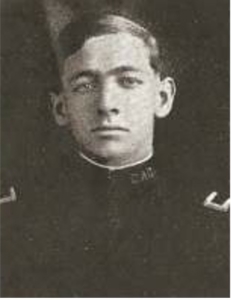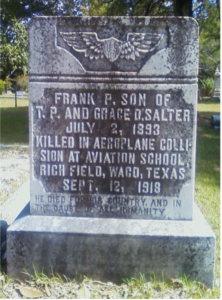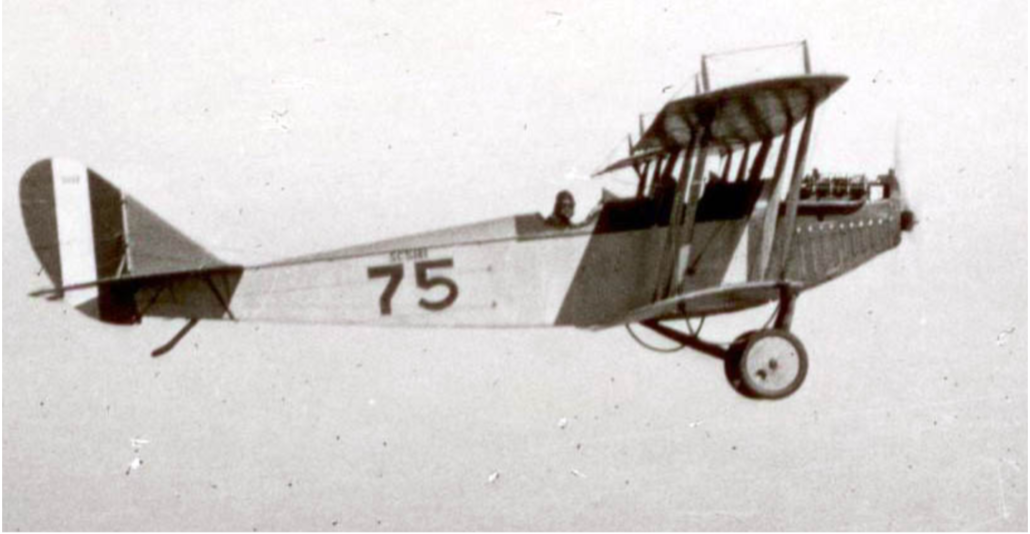Scroll of Honor – Frank Pierce Salter
A New Kind of War
Written by: Kelly Durham
It was a new kind of war, one in which men soared above the battle lines in machines  that few had ever seen and in which fewer still had ridden. Heavier-than-air airplanes, which had not existed at all at the turn of the century, were now helping generals see beyond the horizon and were increasingly being used as aerial weapons to deliver death from above. The United States had been slow to enter the Great War, joining Great Britain and France only in 1917. It had also been slow to develop its own air power. When Congress declared war that April, the Army’s air power consisted of a small section within the Signal Corps composed of only twenty-six pilots. Within months of America’s entrance into the war, Congress authorized $640 million, the largest appropriation in its history, for the construction of an air force. Of course, all of these new airplanes would need pilots. That’s where Frank Salter would come in.
that few had ever seen and in which fewer still had ridden. Heavier-than-air airplanes, which had not existed at all at the turn of the century, were now helping generals see beyond the horizon and were increasingly being used as aerial weapons to deliver death from above. The United States had been slow to enter the Great War, joining Great Britain and France only in 1917. It had also been slow to develop its own air power. When Congress declared war that April, the Army’s air power consisted of a small section within the Signal Corps composed of only twenty-six pilots. Within months of America’s entrance into the war, Congress authorized $640 million, the largest appropriation in its history, for the construction of an air force. Of course, all of these new airplanes would need pilots. That’s where Frank Salter would come in.
Frank Pierce Salter came to Clemson Agricultural College from the tiny crossroads of Trenton in Edgefield County. Salter was a Chemistry major and was a member of the Dancing Club, Tennis Club, and Chemical Club. He graduated in 1914.
Salter took a job as chief chemist for Buckeye Cotton Oil Company. When America entered the war, Salter left his job and enlisted in the Army. By September 1918 he was training to be an Army pilot at Rich Field in Waco, Texas. In a sign of the times, Salter, though only a private first class in rank, was a cadet pilot learning his new craft in a Curtiss JN-4 biplane. Salter had already completed ten hours of solo flying when he took off for a training flight on September 12, 1918. One of his objectives on this flight was to practice spin recovery. Unfortunately, on this warm and pleasant evening, Salter’s wasn’t the only airplane in the sky over Rich Field. Cadet Frank Oliver was also in the air, also flying a Curtiss biplane and, like Salter, also practicing spins.
At approximately 6:10 p.m., both cadets put their aircraft into spins, Salter spinning to the left and Oliver to the right—apparently contrary to instructions given him on the ground. Neither pilot saw the other as the angles of their wings obstructed their vision. The two airplanes collided in mid-air and plummeted to the ground. Oliver was killed and Salter seriously injured. He died a short time later.
The board of officers investigating the accident judged it to have been avoidable and noted  that Oliver’s spin to the right was “in disobedience to instructions.” But the board stopped short of pinning the blame for the tragedy on Oliver, saying “that it was impossible to determine if disobedience was willful or due to some necessity.”
that Oliver’s spin to the right was “in disobedience to instructions.” But the board stopped short of pinning the blame for the tragedy on Oliver, saying “that it was impossible to determine if disobedience was willful or due to some necessity.”
Salter’s body was returned to Trenton and buried with full honors. He was survived by his parents, three sisters, and two brothers, one fighting in France, the other a midshipman at Annapolis.
For more information on Frank Pierce Salter see:
https://soh.alumni.clemson.edu/scroll/frank-pierce-salter/
For additional information about Clemson University’s Scroll of Honor visit:

